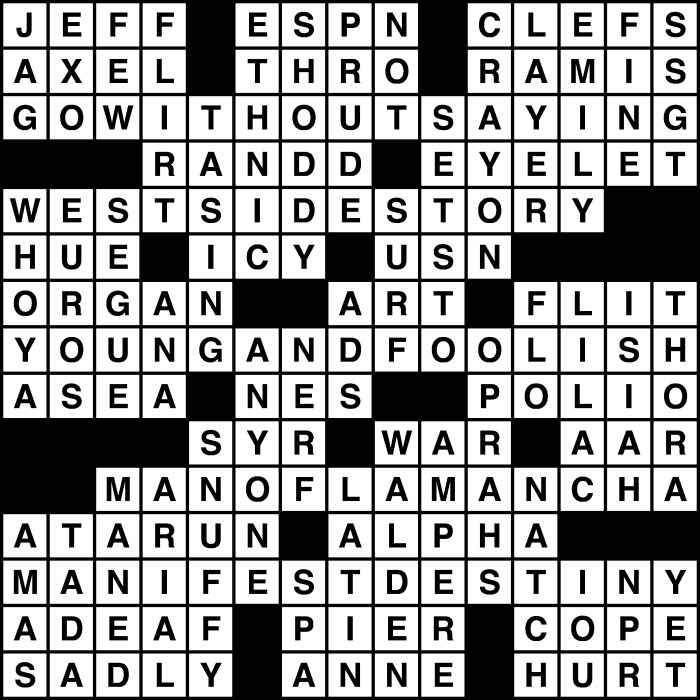Unveiling the intricacies of the “equal 3 words crossword clue,” this discourse delves into the multifaceted concept of equality, its historical evolution, and the challenges and strategies surrounding its pursuit.
From ancient philosophies to contemporary movements, the journey towards equality has been marked by both progress and setbacks. This exploration examines the complexities of this fundamental human right, shedding light on its significance and the ongoing efforts to achieve a just and equitable society.
Equality Concepts

Equality, a fundamental human right, is the concept that all individuals deserve equal rights, opportunities, and treatment regardless of their differences.
Equality manifests in various aspects of life, including:
Legal Equality, Equal 3 words crossword clue
- Equal protection under the law
- Non-discrimination based on race, gender, religion, or other protected characteristics
Social Equality
- Equal access to education, healthcare, and employment
- Respect and dignity for all individuals
Economic Equality
- Equal opportunities for economic advancement
- Fair distribution of wealth and resources
Promoting equality is crucial for creating a just and equitable society where everyone has the chance to reach their full potential.
Synonyms and Related Terms

The term “equal” holds a profound significance in various contexts. Synonyms of equal, such as equivalent, identical, and commensurate, share the common thread of denoting a state of equality, where entities possess the same value, status, or characteristics.
Concepts closely related to equality include fairness, equity, and impartiality. These terms contribute to a comprehensive understanding of equality by encompassing different aspects of just and unbiased treatment. Fairness implies treating individuals or groups justly, equity ensures that resources are distributed based on need, and impartiality denotes neutrality and freedom from bias.
Synonyms of “Equal”
- Equivalent: Having the same value, worth, or significance.
- Identical: Exactly alike in every respect.
- Commensurate: Corresponding in size, degree, or value.
- Similar: Having a resemblance in appearance, character, or quality.
- Comparable: Capable of being compared or considered as equivalent.
Historical Perspectives on Equality

The concept of equality has undergone a significant evolution throughout history, influenced by cultural, social, and political factors. From ancient civilizations to modern times, the pursuit of equality has shaped societies and continues to be a fundamental aspiration.
Ancient Foundations
In ancient societies, notions of equality varied widely. In some cultures, such as ancient Greece, equality was primarily associated with male citizens, while women and slaves were considered inferior. However, other societies, such as the Iroquois Confederacy, practiced a form of gender equality and democratic decision-making.
Religious and Philosophical Influences
Major religions, including Christianity, Islam, and Buddhism, have played a significant role in shaping ideas of equality. These religions emphasize the inherent worth of all individuals and promote compassion and justice. Philosophical movements, such as the Enlightenment, further developed these concepts, emphasizing the natural rights and freedoms of all people.
Social Movements and Revolutions
Throughout history, social movements and revolutions have been instrumental in advancing equality. The abolitionist movement in the United States, for example, fought for the emancipation of enslaved people. The women’s suffrage movement campaigned for equal political rights for women. These movements have left a lasting impact on our understanding of equality and have contributed to the expansion of rights and opportunities for marginalized groups.
Equal is a common answer to the crossword clue “3 words”. Another example of equality is found in the story “Harrison Bergeron” by Kurt Vonnegut. In this story, everyone is forced to be equal in all aspects, including physical and mental abilities.
However, one man, Harrison Bergeron, rebels against this forced equality and ultimately sacrifices himself to restore individuality to society. Is Harrison Bergeron a hero or a fool for his actions? That’s up to the reader to decide.
Challenges to Equality: Equal 3 Words Crossword Clue
Achieving equality in all aspects of life remains an elusive goal, facing numerous challenges that hinder progress. Systemic barriers, ingrained biases, and persistent prejudices create obstacles to equal opportunities, perpetuating cycles of discrimination, inequality, and oppression.
Systemic Barriers
Systemic barriers are institutionalized structures and policies that create and maintain unequal access to resources and opportunities. These barriers can manifest in various forms, including:
- Unequal distribution of wealth and income
- Disparities in access to education, healthcare, and housing
- Discrimination in employment and promotion
- Lack of representation in leadership positions
Bias and Prejudice
Bias and prejudice are deeply ingrained attitudes and beliefs that favor certain groups over others. These biases can be conscious or unconscious, influencing decisions and actions in ways that perpetuate inequality. Examples of bias and prejudice include:
- Stereotyping based on race, gender, or other group affiliations
- Prejudice against individuals with disabilities
- Homophobia and transphobia
Discrimination, Inequality, and Oppression
Discrimination, inequality, and oppression are the direct consequences of systemic barriers and biases. Discrimination involves treating individuals unfairly based on their group affiliation, while inequality refers to unequal distribution of resources and opportunities. Oppression is a systematic and prolonged form of discrimination that creates and maintains power imbalances.
Strategies for Promoting Equality

Promoting equality is a multifaceted endeavor that requires a comprehensive approach. By implementing strategies that address the root causes of inequality, we can create a more just and equitable society for all.
Role of Laws, Policies, and Social Initiatives:
- Enact anti-discrimination laws to prevent unfair treatment based on race, gender, sexual orientation, disability, or other protected characteristics.
- Implement affirmative action policies to increase opportunities for underrepresented groups in education, employment, and other areas.
- Support social initiatives that provide resources and support to marginalized communities, such as affordable housing, healthcare, and education programs.
Importance of Education, Awareness, and Empathy:
- Promote education about diversity, inclusion, and the history of inequality to foster understanding and empathy.
- Raise awareness about the challenges faced by marginalized groups and the importance of creating a more inclusive society.
- Encourage empathy by providing opportunities for people to interact with and learn from those who are different from them.
Examples of Equality in Practice
Equality in practice is not merely a concept; it is an active pursuit that requires dedicated efforts from individuals, organizations, and communities. Throughout history, there have been countless examples of individuals and organizations striving to promote equality, leading to positive outcomes for individuals, communities, and society as a whole.
One notable example is the work of the United Nations, which has been at the forefront of promoting equality globally. Through its various agencies and programs, the UN works to address issues such as poverty, discrimination, and human rights violations.
By providing support and resources to countries and communities around the world, the UN has played a crucial role in advancing equality and improving the lives of countless people.
Initiatives for Equality
Beyond international organizations, there are numerous initiatives and grassroots movements dedicated to promoting equality at the local level. One such initiative is the “Black Lives Matter” movement, which emerged in response to the ongoing systemic racism and police brutality faced by Black communities in the United States.
Through protests, community organizing, and advocacy, the movement has raised awareness about racial inequality and pushed for reforms to address these injustices.
Successful Strategies
Successful strategies for promoting equality often involve a combination of advocacy, education, and community engagement. Advocacy campaigns can raise awareness about issues of inequality and push for policy changes that address these issues. Education programs can help to break down stereotypes and promote understanding and empathy among different groups of people.
Community engagement initiatives can bring people together to work towards common goals and build a sense of shared purpose.
Impact of Equality Efforts
The impact of efforts to promote equality can be seen in the lives of individuals, communities, and society as a whole. For individuals, equality can mean increased opportunities, improved access to resources, and a greater sense of dignity and belonging.
For communities, equality can lead to greater social cohesion, reduced conflict, and improved overall well-being. For society as a whole, equality can contribute to economic growth, innovation, and a more just and equitable world.
General Inquiries
What is the principle of equality?
Equality is the fundamental human right that all individuals are entitled to equal opportunities and treatment, regardless of their race, gender, religion, sexual orientation, or any other characteristic.
What are some examples of equality in practice?
Examples of equality in practice include equal access to education, employment, healthcare, and political participation for all individuals, regardless of their background or circumstances.
What are the challenges to achieving equality?
Challenges to achieving equality include systemic barriers, biases, prejudices, discrimination, and inequality, which can hinder equal opportunities and perpetuate social injustice.